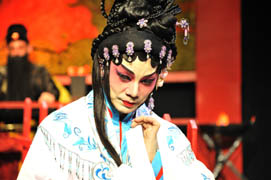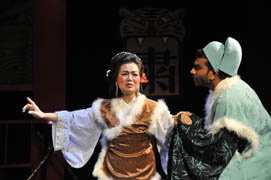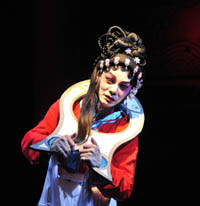
Glenda Frank
| Justice With Supertitles
THE CHALK CIRCLE
"The Chalk Circle" is best known to western audiences as the inspiration for Bertolt Brecht’s epic drama "The Caucasian Chalk Circle." The current staging has a contemporary feel, reminiscent of the polyglot nature of many modern films that use various languages to create authenticity. The supertitles are easy to follow throughout the 90 minute staging. Brecht would have appreciated the distancing effect of having groups of actors converse in several idioms. The changing speech rhythms and stylistic exchanges are a performance plus, enhancing the storyline.
The play is at once a melodrama (good conquer evil), a satire on the self-serving family and social corruption, and an encomium to honest judges everywhere. Begonia is the beautiful daughter of a noble family that has fallen on hard times with the father’s death. The brother is a sadistic slacker and the mother is worried about her old age. Begonia becomes a concubine to support the family. Master Ma, a wealthy man, offers to make her his second wife but the mother refuses permission until he promises her financial security. Mistress Ma is not delighted to welcome a young beauty into her household. When Begonia gives birth to a son, she claims the son as her own and, with the help of her lover, a court official, poisons her husband. Begonia is arrested for the murder and tortured into a confession. The play opens as Begonia, already condemned, is relocated to a new jail. She spies her brother and begs him for assistance. He routes her brutal guards and takes her to Judge Bao. With money supposedly borrowed from Begonia, the brother turned a new leaf and bribed his way into a good job in Judge Bao’s court. But even his position does not save him from a beating for aiding his sister.
The turning point comes when the judge hears the case. He cannot separate perjury from truth so he devises a test, similar to King Solomon’s. He places the son within a circle of chalk and asks the women to pull the child toward them. Begonia releases the child’s arms in each test. Judge Bao jails Mistress Ma and her lover and awards all of Master Ma’s property to Begonia and her son. The good mother would prefer losing to harming her child. The performances are a combination of arias by Begonia; slapstick, acrobatics and stylized gestures; method and epic acting; direct address to the audience; and some very poignant and very funny lines. Mistress Ma’s lover took his job in court because he knew other men’s wives would be impressed and sleep with him. But he is head-over-heels in love with his "Big Mama" because she wears enough make-up to start a cosmetics store. The guards are vulgar klutzes; Begonia (obviously played by a male) is very delicate in sound and gesture. One love scene is acted in two languages. The perjured neighbors are a quivering comic chorus during cross-examination. It’s all quite lively and lovely. Shang-Ho Huang, a Columbia University graduate who played the brother, and and Shu-Mei Kwan as Mistress Ma gave memorable performances.
Director Joanna Chan founded the Yangtz Repertory Theatre of America in 1992 to produce works for and by Asian artists. For this production she combined a lead actor from Hong Kong with Caucasian, Asian and Asian-American actors. Cantonese opera is the southern cousin of the better known Beijing opera. Both employ elaborate costumes and make-up that indicates social standing and states of mind. "The Chalk Circle" is a prime example of Yuan drama, which marks an ironic high point in Chinese culture. After the Mongolians invaded China, this ethnic minority became the rulers of the Central Kingdom. Having little use for a civil service system based on education and culture, they “fired” hundreds of government employees who were forced to find new ways to earn a living. The literati found themselves demoted to a class just above beggars. Many of them went into theatre and revitalized a formalized art with acrobatics, social satire, comedy, contemporary stories, and a new style of protagonist with ordinary problems. As a doctoral student in Theatre the 1980s, I was lucky to team up with a student director from Taiwan in a translation and adaptation of the original, which he staged as his master’s thesis at City College with props from friends in the Beijing Opera. This production was a rare treat. |
| museums | NYTW mail | recordings | coupons | publications | classified |




